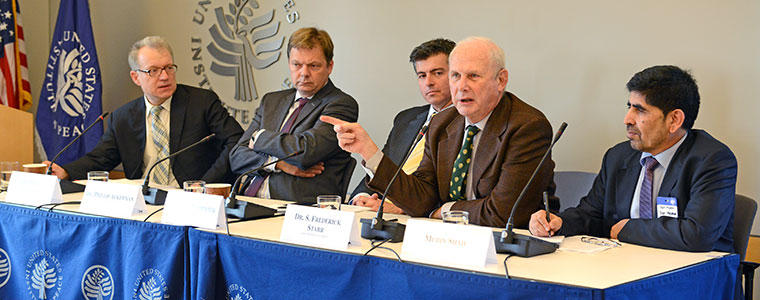Afghanistan Reconnected: Regional Economic Security Beyond 2014
The U.S. Institute of Peace and the EastWest Institute hosted a discussion on the tremendous potential for economic growth and stability in Central Asia. Distinguished leaders and experts discussed how Afghanistan could transition from an aid-dependent economy to one reconnected to the region, with significant prospects for investment and growth via strengthened and productive relationships with its neighbors.

At the end of this year, Afghanistan enters the next phase of its transition, with the withdrawal of international troops and the associated reduction in international aid. To lessen the negative economic impact and to promote continued growth, Afghanistan will need to refocus its development efforts. At the crossroads of Asia, Afghanistan presents attractive investment opportunities in agriculture, energy, mining and infrastructure. Exploiting these resources for the good of the Afghan people requires economic cooperation with the other countries in the region. But it also requires security and political stability.
The event highlighted the key recommendations from the EastWest Institute’s latest report, Afghanistan Reconnected: Regional Economic Security Beyond 2014, based on a consultation series on economic security, held over the past two years in Istanbul, Islamabad, New Delhi and Berlin. The consultations involved leaders from governments, parliaments, the business sector, international organizations and academia.
Agenda
8:30am: Registration and light breakfast
9:00am: Welcome
- Dr. Andrew Wilder; Vice President of South & Central Asia Programs, United States Institute of Peace
- Mr. James Creighton; Chief Operating Officer, EastWest Institute
9:15am-10:30am: Political and Economic Transition in Afghanistan
- His Excellency Dr. Philipp Ackermann
Deputy Chief of Mission, Embassy of Germany to the United States
Former Deputy Special Representative of the German Federal Government for Afghanistan and Pakistan - His Excellency Youssef al-Otaiba
Ambassador of the United Arab Emirates to the United States (tbc) - Mr. Jonathan Carpenter
Deputy Special Representative for Afghanistan and Pakistan, United States Department of State - His Excellency Mozammil Shinwari
Deputy Minister, Ministry of Trade, Commerce and Industries, The Islamic Republic of Afghanistan - Moderator: Ambassador Martin Fleischer
Vice President, Director of the Regional Security Program and head of EWI’s Brussels Center
10:30 a.m. -12:00 p.m.: Afghanistan Reconnected: Regional Economic Security Beyond 2014
- Dr. William Byrd
Senior Expert – Afghanistan, Unites States Institute of Peace - Ambassador Shafqat Kakakhel
Chairperson of the Board, Sustainable Development Policy Institute, Pakistan - Ms. Ambika Sharma
Deputy Secretary General & Head International Affairs Division, Federation of Indian Chambers of Commerce & Industry (FICCI) - Dr. S. Frederick Starr
Chairman, Central Asia-Caucasus Institute, Johns Hopkins University - Ms. Fatema Z. Sumar
Deputy Assistant Secretary, Bureau of South and Central Asian Affairs, United States Department of State - Moderator: Mr. Scott Smith
Director, Afghanistan and Central Asia Programs, United States Institute of Peace



